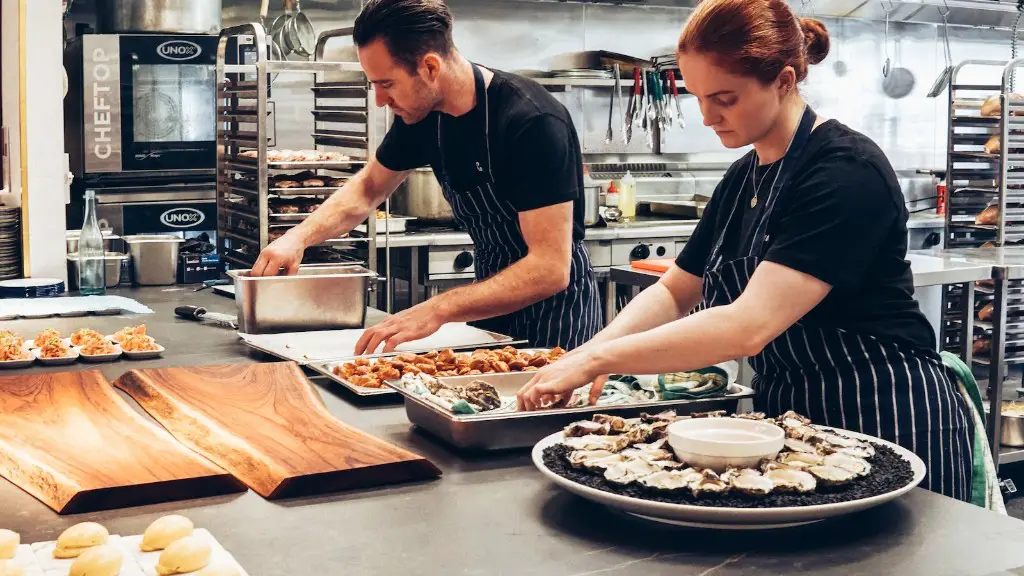A franchise restaurant is a great way to open your own business with the support of an established brand. There are many franchise opportunities available, so it is important to do your research to find the right fit for you and your goals. The process of opening a franchise restaurant typically includes choosing a concept, finding a location, and completing the necessary paperwork and approvals. With the help of a franchise, you can have your own restaurant up and running in no time.
There are a few key steps you need to take in order to open a franchise restaurant. First, you need to research the franchisor and make sure that their brand and business model is a good fit for you. Next, you need to submit a franchise application and go through the franchisor’s approval process. Once you’re approved, you’ll need to sign a franchise agreement and pay the associated fees. Finally, you’ll need to find a suitable location for your restaurant and build out the space according to the franchisor’s specifications.
How much money do you need to open a franchise restaurant?
If you’re thinking about buying a franchise, it’s important to know that the cost can vary widely – from $50,000 to $6 million. Most startup investments for franchise restaurants fall in the $200,000 to $300,000 range. And, depending on the franchisor, you may not be able to borrow funds to cover these startup costs. Some franchisors require unborrowed funds and a minimum net worth for approval. So, be sure to do your research and understand the financial requirements before you make any commitments.
Franchising can be a great way to expand your business and gain new customers. But before you get started, there are a few things you need to do to get ready.
1. Prepare Your Franchise Disclosure Document
Your Franchise Disclosure Document (FDD) is a key part of your franchise agreement. It outlines the terms of your franchise agreement and includes important information about your business.
2. Prepare Your Franchise Operations Manual
Your Franchise Operations Manual is a guide for franchisees that outlines how your franchise should be operated. It includes information on policies, procedures, and processes.
3. Protect your Intellectual Property
Your intellectual property is your franchise’s most valuable asset. Make sure you have the appropriate trademarks, copyrights, and patents in place to protect your business.
4. Establishing a New Franchising Company
If you’re starting a new franchising company, there are a few things you need to do to get started. You’ll need to choose a business structure, register your business, and obtain the necessary licenses and permits.
5. Issue and Register your FDD
Once you’ve prepared your FDD, you’ll need to
Is it better to open your own restaurant or franchise
There is no clear answer as to whether it is better to open your own restaurant or franchise. Ultimately, it comes down to your personal goals as an entrepreneur, your financial abilities and the resources that you have available to you.
If you are passionate about the restaurant industry and have a clear vision for your business, then starting your own restaurant may be the best option for you. However, it is important to note that this option can be very risky and requires a significant amount of financial investment.
If you are looking for a more secure option with less financial risk, then franchising may be the better choice for you. When you franchise, you are essentially buying into an already established brand and business model. This can provide you with a lot of support and guidance as you get started, which can be very helpful for those who are new to the industry.
Ultimately, the decision of whether to start your own restaurant or franchise comes down to your personal goals and circumstances. If you have the financial resources and industry knowledge, starting your own restaurant can be a very rewarding experience. However, if you are looking for a less risky option, franchising may be the better choice for you.
Buying a franchise might seem like easy money, but those royalties and fees will quickly cut into profit margins. The majority of franchise owners earn less than $50,000 per year.
How often do you pay a franchise fee?
Monthly franchise royalties are a common fee charged by franchisors. These fees are typically a percentage of your revenue, and are collected on a monthly basis. Marketing fees are also often based on a percentage of your revenue.
Franchise taxes are a type of tax that is paid in addition to federal and state income taxes. The amount of franchise tax can differ greatly depending on the tax rules within each state. Kansas, Missouri, Pennsylvania, and West Virginia have all discontinued their corporate franchise taxes.
How much do franchise owners make?
There are many factors that affect a franchisee’s earnings, such as the size of the franchise, the location, the type of business, and the management style. However, on average, a franchisee can expect to earn around $80,000 a year. Some franchisees may earn significantly more, depending on the factors mentioned above.
There is no simple answer to whether restaurants are profitable. It depends on many factors, including the size and type of restaurant, as well as economic conditions. However, it is generally true that restaurants have low profit margins. It takes an average of two years for a new restaurant to turn a profit.
What is the best food franchise to open
There are many great restaurant franchises in India today that are ruling the food industry. Some of the best include KFC, Subway, Domino’s Pizza, Dunkin’ Donuts, Pizza Hut, Tibbs Frankie, and WOW! Momo. These franchises offer great food at reasonable prices, and they are always expanding to new locations to serve their loyal customers. If you’re looking for a great place to eat, be sure to check out one of these franchises!
There are 5 main disadvantages to buying a franchise:1 – Costs and Fees
2 – Lack of Independence
3 – Guilt by Association
4 – Limited Growth Potential
5 – Restrictive franchise agreements.
1. Costs and Fees – Franchises often require a large up-front investment, as well as ongoing costs and fees. These can include the initial franchise fee, royalty fees, marketing fees, and more.
2. Lack of Independence – As a franchisee, you will be required to follow the franchisor’s system and guidelines. This can limit your ability to be creative and run your business the way you want.
3. Guilt by Association – If the franchisor gets into legal or financial trouble, it can reflect negatively on the franchisees.
4. Limited Growth Potential – Franchises often have limited growth potential because they are only able to expand within the franchisor’s territory.
5. Restrictive Franchise Agreements – The franchise agreement can be restrictive,dictating things like what products you can sell, what hours you can keep, and more.
What happens if your franchise fails?
In this scenario, the franchisor’s business assets are sold off. The assets a franchisor has are the brand and the franchise agreements. However, on a liquidation, franchisees will be able to argue that their franchise agreement has come to an end and that they are released from any obligations.
Franchising can be a great way to get started in business, but there are some disadvantages to consider as well. One downside is that you may have limited creative opportunities. You may also have to share financial information with the franchisor, and support can vary. Additionally, initial investments and start-up costs can be expensive, and contracts may not be permanent. Finally, remember that you’re your own boss, but you may have less individual control.
Do franchise owners have to work
There are a few reasons that this type of business model is appealing to many people. The first is that it requires less of a time commitment from the owner. The second is that it can be less expensive to set up than a traditional business, since the owner does not need to purchase or lease commercial space. And third, the owner can still reap the rewards of owning a successful business without having to put in long hours.
If you’re considering a franchise, be sure to ask about the level of involvement required from owners. Some franchises may require that you be on-site regularly, while others may give you more flexibility.
There are a number of reasons for the profitability of fast food franchises compared to other types of businesses. For one, fast food franchises have much lower overhead costs than most other businesses. They also benefit from economies of scale, as they are able to buy ingredients in bulk at a lower cost. Additionally, fast food franchises have a built-in customer base, as people are always looking for quick and affordable meals.
Do small restaurant owners make money?
There is a wide range in the estimated annual earnings of restaurant owners, with Payscale.com suggesting a range of $31,000-$155,000 and Chron.com estimating a range of $29,000-$153,000 per year. The national average is estimated to be around $65,000 per year by both sources. These wide ranges highlight the fact that earnings can vary greatly depending on the specific restaurant, location, and owner.
Typically, entrepreneurs looking to finance a franchise transfer need to put 20% down, while a new location or startup business requires 25 – 30% down. This is because franchisors often have more faith in established businesses, and thus require less money up front. However, this is not always the case – some franchisors may require the same amount of money down for a transfer as they would for a new location.
Does a franchise restaurant charge you monthly
Franchisees benefit from the established reputation of the franchisor, which can make it easier to attract customers. In exchange for this, franchisors often require franchisees to invest in advertising and marketing activities that promote the brand. These fees can be a percentage of revenue or a flat monthly fee, and they can be significant.
While franchisees are not technically employees of a franchise brand, they can be “fired” by franchisors, who reserve the right to terminate their contract “for cause.” This involves ending the relationship based upon a default under the franchise agreement. Franchisees can also be terminated for non-renewal of their contract, “where the franchisor is not required to provide a reason.”
Conclusion
The first step is to research the Franchisor and the franchise industry. The second step is to complete a Franchise Application and Personal Financial Statement. These are typically available on the Franchisor’s website. The third step is to attend a Discovery Day event hosted by the Franchisor. This is your opportunity to learn more about the Franchisor, the franchisee, and the day-to-day operations of the franchise. The fourth step is to sign a Franchise Agreement and pay the initial franchise fee. The fifth step is to find a location and build out the restaurant according to the Franchisor’s specifications. The sixth step is to hire staff and train them to the Franchisor’s standards. The seventh step is to open the doors and start serving customers!
If you want to open a franchise restaurant, you need to follow some specific steps. First, you must research the different franchisors and identify the one that best fits your needs and interests. Next, you need to submit a franchise application and go through an interview process. Once you are approved, you will need to sign a franchise agreement. Finally, you will need to obtain the necessary financing to open and operate your franchise restaurant.





